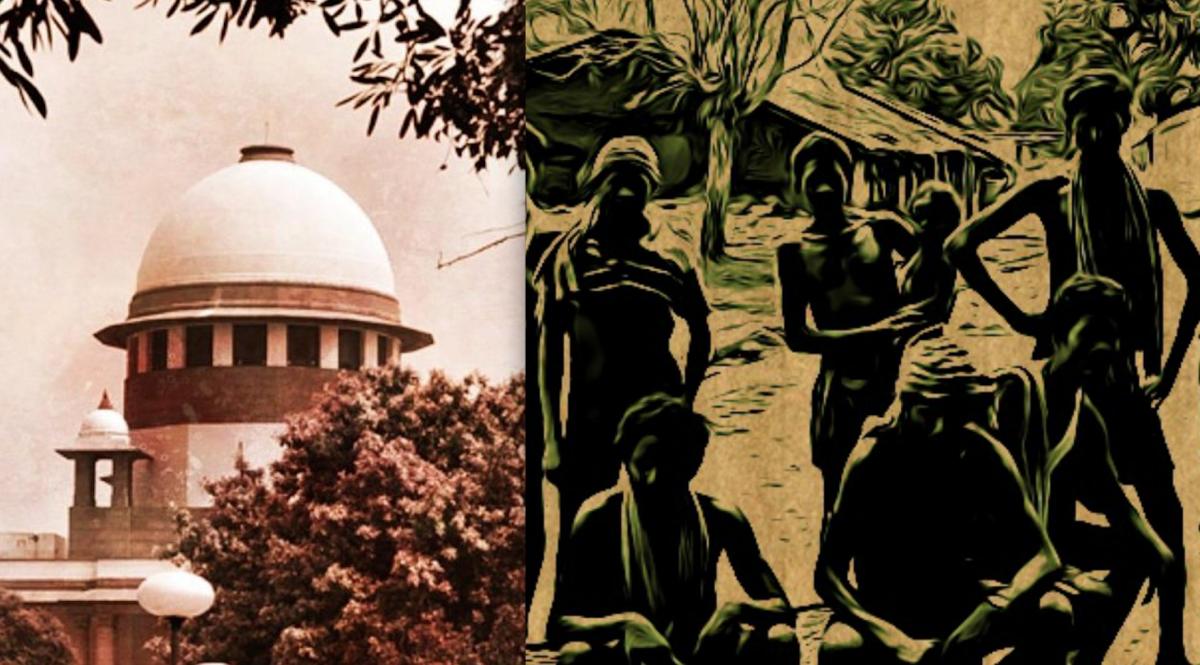The Supreme Court has directed states who have not filed compliance affidavits on the matter of implementation of the Forest Rights Act, 2006 to do so within a fortnight’s time. Wild Life First v/s Union of India –a batch of petitions filed in 2008 challenging the constitutional validity of the Forest Rights Act of 2006 came up for hearing before the court at 3.50 p.m. on August 6. The hearing of the case has now been scheduled for September 12. Interveners that include Adivasi organisations, concerned citizens and academics have also been permitted to address the court and file written arguments on crucial issues that require deliberation. Detailed arguments are likely to resume in the month of September. Adivasi women leaders, Sokalo Gond and Nivada Rana backed by the All India Union of Forest Working Peoples (AIUFWP) and Citizens for Justice and Peace (CJP) have also intervened.

Image Courtesy: https://theleaflet.in/
States of Andhra Pradesh, Chhattisgarh, Madhya Pradesh, Odisha and Tamil Nadu have already filed affidavits. A controversial affidavit filed by the Forest Survey of India (FSI) is also reported to be on the records.
The matter, being heard since 2008, made the headlines when the Supreme Court on February 13,2 019 “ordered the evictions of millions of Adivasis and Forest Dwellers.” Protests and condemnations followed. Thereafter, on February 28, hearing in the case on the Forest Rights Act (FRA), 2006, the Supreme Court had stayed its February 13 eviction order. The court had also pulled up the Centre for waking up from its “slumber” and claiming that due process was not followed by states while passing the rejection orders against the dwellers. Though the order was subsequently stayed by the SC, the fate of these people still hangs in the balance and their future remains uncertain. The loss of not just their homes, but also their livelihoods threatens to deal twin body blows from which these marginalised and vulnerable people are unlikely to recover.
When the matter thereafter came up, post elections on July 24, In the five months since then, 19 intervention applications have been filed in the matter, all defending the constitutional validity of the Forest Rights Act 2006, a historic legislation that brings a jurisprudential shift in recognising the livelihood rights of traditional forest Dwellers, Adivasis and Dalits. These include an intervention filed by retired bureaucrats and academics, Sharad Lele and Nandini Sundar. Among the 19 interventions is one by two Adivasi women leaders.
Adivasi human rights defenders Sokalo Gond and Nivada Rana have moved Supreme Court praying for justice for millions of forest dwellers, especially women, who have been denied forest rights, and now face the prospect of eviction from their traditional habitats. The duo have filed an intervention application in the ongoing case led by Wildlife First.
Sokalo and Nivada’s intervention application is supported by the All India Union of Forest Working People (AIUFWP) and Citizens for Justice and Peace (CJP), two organisations that have been actively campaigning for forest rights. What makes this intervention application special is that it explains how the law is in statutory line with Schedules V, VI and IX of the Constitution. Forest Rights Act 2006 is the first and only law that recognises the independent rights of women over land and cultivation. The law was brought in to set right the imbalance of power in favour of a Repressive Forest Department empowered by the colonial-era Indian Forest Act of 1927.
Adivasis and forest dwelling communities have already borne the brunt of historical injustices at the hands of the British colonists who brought about legislations to appropriate forest land and produce. What subsequent administrations failed to acknowledge is that these traditional forest dwelling communities are also the ones protecting our environment and biodiversity from twin threats from greedy corporations and climate change.
Widespread campaigns and protests were held in the lead up to the hearing of the case. Letters were written by Adivasi and farmer organisations to all chief ministers, urging them to file affidavits in the Supreme Court seeking recall of its now stayed February 13 order directing the eviction of 10 lakh forest dwellers alleged to have “illegally” encroached upon forest land.
In this letter, protesters have explained the reason behind writing to all the chief ministers, saying that “erroneous interpretation” of the Forest Rights Act — that rejection of claims must result in evictions — continued to “hold the field” despite the court’s February 28 order.
“We believe that there is an impression that after the Supreme Court order dated 28.2.2019 staying its earlier order putting the orders for eviction ‘on hold’, there is no further need for the order dated 13.2.2019 to be recalled or modified,” it said. “However, despite the fact that the directions for eviction have been put ‘on hold’ by the court, the erroneous interpretation of the FRA advanced by the writ petitions that rejection of claims must, by definition, result in evictions continues to hold the field.”
After the February 13 order, Congress leader Rahul Gandhi had asked all party-ruled states to file review petitions in the Supreme Court against its order to evict tribals and forestland dwellers whose claims had been rejected. Two days later, BJP president Amit Shah had issued a similar directive to all party-ruled states.
Related Articles:
States claim procedural lapses in processing FRA land claims, ask for more time
Call to CMs against Evictions of Forest Dwellers